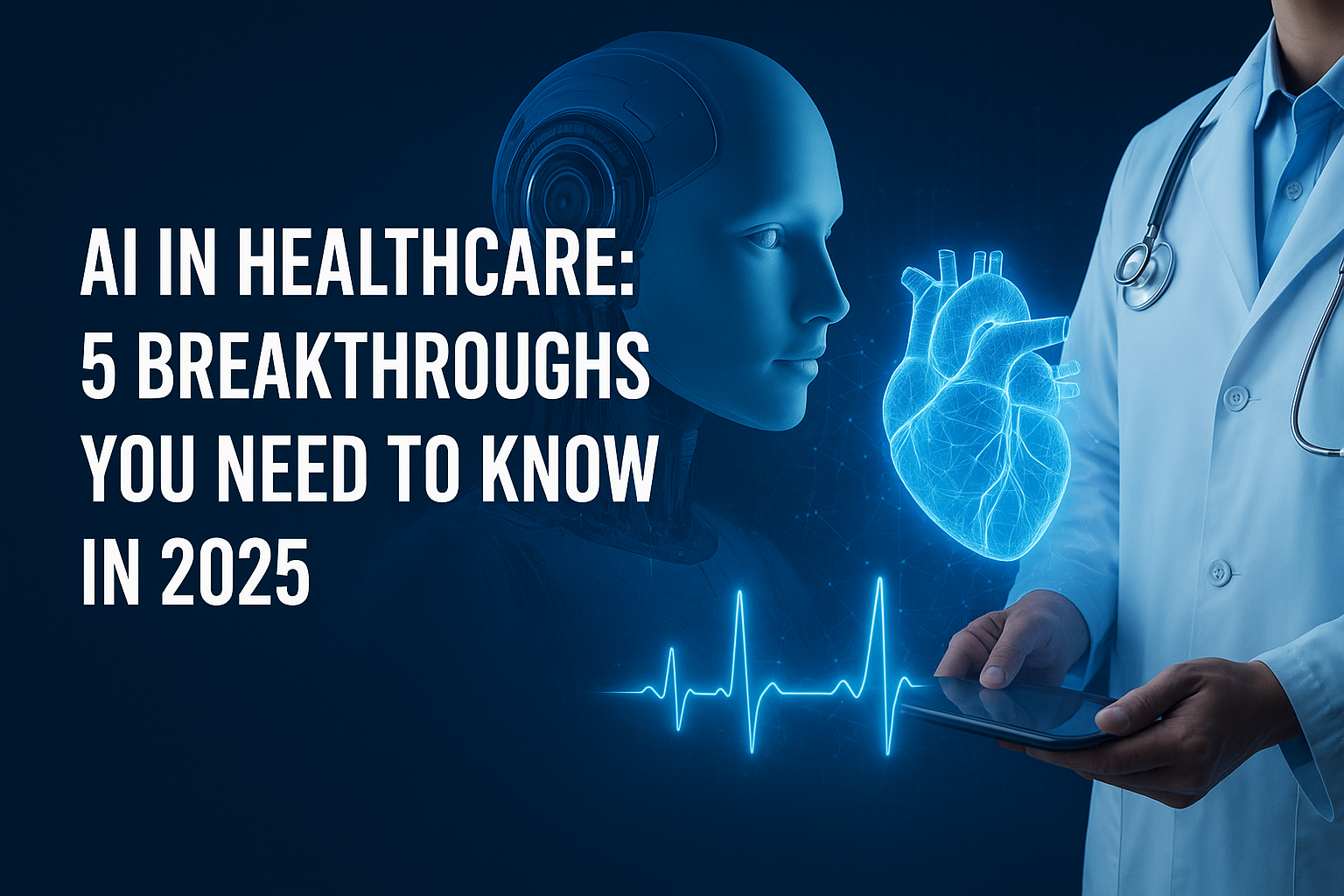Artificial Intelligence (AI) is no longer just a buzzword—it has become a powerful force reshaping industries, and healthcare is at the top of that transformation. In 2025, AI-driven innovations are making healthcare faster, smarter, and more personalized than ever before. From diagnosing diseases earlier to assisting surgeons in complex procedures, AI is bridging the gap between human expertise and machine precision.
If you want to understand how AI is revolutionizing medicine, here are five breakthroughs in healthcare AI you need to know in 2025.
1. AI-Powered Disease Diagnosis and Early Detection
One of the most promising applications of AI in healthcare is its ability to detect diseases earlier than traditional methods. In 2025, AI models are achieving diagnostic accuracy that rivals or even surpasses human doctors in certain areas.
- Cancer detection: AI algorithms can analyze medical images (X-rays, MRIs, CT scans) with incredible precision, spotting tiny anomalies that may be missed by the human eye. For example, AI-powered mammogram analysis is now reducing false negatives in breast cancer screening.
- Neurological conditions: AI is being used to identify early markers of Alzheimer’s and Parkinson’s, giving patients a better chance at early intervention.
- Heart disease prediction: By analyzing patient data and ECG results, AI can predict the risk of heart attacks years in advance.
This breakthrough is not about replacing doctors but about empowering them with advanced tools to make faster, more accurate decisions.
2. Personalized Treatment Through AI-Driven Precision Medicine
Every patient is unique, yet for decades, healthcare treatments were designed around “one-size-fits-all” approaches. In 2025, AI is making personalized medicine a reality.
AI systems can analyze a person’s genetic profile, medical history, and lifestyle factors to recommend treatments tailored specifically for them. For example:
- Oncology treatments: AI recommends the best combination of therapies (chemotherapy, immunotherapy, targeted drugs) for individual cancer patients, maximizing effectiveness while reducing side effects.
- Chronic disease management: Patients with diabetes or hypertension are getting AI-driven treatment adjustments in real-time based on continuous health monitoring.
- Drug response prediction: AI predicts how patients will respond to certain drugs before prescribing them, reducing trial-and-error prescriptions.
This precision approach is improving patient outcomes while reducing healthcare costs.
3. Robotic Surgery Assisted by AI
AI-powered robotic surgery has advanced rapidly in 2025, becoming one of the most impressive medical breakthroughs. Surgeons now have the ability to perform minimally invasive procedures with greater precision and control.
- Microsurgeries: AI-assisted robots can operate on delicate tissues, blood vessels, or even nerves with millimeter-level accuracy.
- Reduced recovery times: Patients undergoing robotic-assisted surgeries often experience faster healing, less pain, and lower risk of complications.
- Remote surgeries: With AI, surgeons can operate on patients from miles away using robotic systems, expanding access to specialized care in remote areas.
This technology doesn’t replace human surgeons—it enhances their skills and allows them to perform at levels previously unimaginable.
4. AI in Drug Discovery and Development
Developing new drugs is a time-consuming and costly process. Traditionally, it takes over 10 years and billions of dollars to bring a new drug to market. In 2025, AI is speeding up drug discovery dramatically.
- Protein structure prediction: AI models like AlphaFold have cracked the code for understanding how proteins fold, a crucial step in developing new medicines.
- Faster clinical trials: AI helps identify the right candidates for clinical trials, predicts outcomes, and even simulates results, reducing time and costs.
- Repurposing old drugs: AI is also discovering new uses for existing drugs, helping in the fight against rare diseases and pandemics.
For example, during global health crises, AI has been instrumental in identifying antiviral drugs in record time, proving its unmatched potential.
5. Virtual Health Assistants and Remote Patient Monitoring
The rise of AI-powered virtual assistants is changing the way patients interact with healthcare providers. In 2025, digital health companions are available 24/7 to provide support, reminders, and guidance.
- Remote monitoring: Wearables powered by AI continuously track heart rate, oxygen levels, blood sugar, and more. These devices send real-time alerts to doctors if abnormalities are detected.
- Telemedicine support: AI chatbots and virtual nurses answer patient queries, schedule appointments, and provide medication reminders.
- Mental health support: AI-driven apps now offer personalized cognitive-behavioral therapy (CBT) sessions and mood tracking, helping people manage anxiety and depression.
This breakthrough not only improves healthcare accessibility but also eases the burden on hospitals by preventing unnecessary visits.
Challenges and Ethical Considerations
While AI in healthcare is full of promise, 2025 also brings important challenges that cannot be ignored:
- Data privacy: Patient data security must be a top priority, as AI systems rely on sensitive medical records.
- Bias in AI models: If not carefully trained, AI can inherit biases from data, leading to unequal treatment outcomes.
- Human oversight: AI should complement, not replace, human judgment. Doctors must remain central to healthcare decisions.
Ensuring ethical use of AI will determine how sustainable and beneficial these breakthroughs become in the long run.
Conclusion: A Smarter, Healthier Future with AI
The year 2025 marks a turning point for healthcare powered by Artificial Intelligence. From early disease detection and personalized medicine to robotic surgeries and AI-driven drug discovery, these breakthroughs are improving patient care and saving lives.
AI is not here to replace doctors—it’s here to give them superhuman capabilities. By combining human empathy with machine intelligence, the healthcare industry is entering a new era of innovation, accessibility, and precision.
For patients, it means faster diagnoses, better treatments, and more proactive care. For doctors, it means smarter tools and greater efficiency. And for society, it means a healthier, more connected future.
As we move forward, the key will be ensuring AI in healthcare remains ethical, safe, and centered on patient well-being. The next decade promises even more breakthroughs—and 2025 is just the beginning.
